- Home
- Elizabeth E. Wein
The Pearl Thief Page 6
The Pearl Thief Read online
Page 6
‘They really don’t go around causing trouble,’ I said. ‘Not any more than anyone else does, anyway. Not on purpose.’
Frank was finished with his cigarette. I’d neglected mine for so long it had gone out, and I didn’t want to draw attention to my inefficiency by asking him to light it again, so I discreetly stubbed it to pieces. Then I realised I was still holding the brown envelope with Dr Housman’s Oxford address on it, so I stretched out my hand to put it back on Frank’s desk.
And a little pearl dropped out into my lap. Frank, still standing, didn’t notice it, and neither did I until I looked down.
I thought it dropped off me at first – as if I’d been wearing it in my hair, or as an earring. It was the size of a barley grain and perfectly round. It lay there in the cradle of woollen skirt between my knees. It was beautiful and perfect.
Why was it in that envelope anyway? Had Grandad sent it to Dr Housman? Or just put it in there for safekeeping? Or had Dr Housman put it there himself – had he found it in the Murray Collection? The last of the Murray pearls?
I picked it up – it was so smooth I had to wedge it beneath my fingernail to get hold of it.
And I remembered.
I remembered leaving the library. I remembered walking to the beachy place in the burn, and lying on the rock there with my arm in the water, and falling asleep. And I remembered the splashing that woke me.
When I opened my eyes there was a man standing in the burn. He hadn’t been there when I lay down, but I had been dozing and dreaming and feeling sorry for Mémère for having to leave Strathfearn at the end of the summer, and for Mother who’d grown up there, and a little sorry for myself perhaps; and I’d been looking up at the sky, and he must have worked his way downstream. The beachy place is at a bend, and you can’t see around it when you are lying on the rocks hidden by hazel shoots, like I was.
I looked up and saw him standing over by the tall Drookit Stane in the middle of the stream. He was in water up to his waist. He was bearded, with wiry whiskery sideburns the exact same horse-chestnut colour as the clear river depths. He had a soft wool cap. That’s the only thing I remembered about his clothes – not their colour, not their pattern, not if they were tweed or tartan or oilcloth. It was his face that startled me most. One eye was swollen shut and his lip was split – fresh, red blood oozing beneath his nose. But the reason I noticed his face wasn’t because it was so battered but because of how discs of light played over it, dappling his pink, shining skin with moving spangles of brightness, as if someone were sitting on the bank throwing gold coins at his head.
I thought: He’s not stealing salmon. He doesn’t know what he’s doing. He’s not hard enough to be a poacher.
Then I realised he was fishing for pearls. But he wasn’t a proper pearl fisher, either. He had all the kit for pearl fishing – glass-bottomed jug, shoulder satchel, pearl stick – but he carried it awkwardly, as if it were getting in his way, as if he were in costume. He was as ignorant as the man I’d caught with Grandad, but unlike the one who’d pointed the gun at me, this man was comical.
He took a deep breath, bent over and put his battered face in the water for a good long half a minute. Then he stood up, gasped and did it again. His head went the whole way under. His cap came off, and he splashed about as he tried to grab it back. It drifted away downstream.
I sat up, snickering behind one hand, and dabbled my feet off my rock to watch the show. He looked up when he heard me. We stared at each other in astonishment.
And then the explosion in my head.
‘Julie?’
Francis Dunbar was on his knees beside me, holding my hand. The wave of memory had submerged me for a whole minute, while I’d just sat staring and let it all come flooding back. Now I looked down at our hands clasped together, and then at Frank’s face. He wasn’t being forward – he was concerned and, I think, a bit frightened.
‘Oh!’ I said, pulling my hand back.
He let go of it instantly. ‘I’m sorry – I …’
I knew. There was no question in my mind that the bloodied man I’d seen in the river had been Hugh Housman.
I needed to tell Mother, but I couldn’t share this tremendous strange vision, like a remembered dream, with someone I scarcely knew. Not that moment.
‘It’s my head.’ I swallowed. ‘Every now and then the headache starts up and I get dizzy.’
He stood up quickly. ‘Your maid’s just come back. I’ll go next door and get her.’
‘She’s not a maid. She’s my grandmother’s companion.’ I stood up. I was fine – physically, I was all right. ‘She’s been making lunch for me. I’d better go and let her know I’m here.’
‘Thank you for helping me with the terrace door,’ Frank said.
‘It was my pleasure,’ I answered, smiling up at him as he ushered me out.
He was careful not to touch me again.
The pearl was still stuck beneath my fingernail, invisible.
No one knew it was there but me.
This time I thought I’d keep it.
4
MY JANGLED BRAIN AND THE YELLOW DOG
Of course as soon as my returning memory offered up an actual picture of the missing Dr Hugh Housman, after he was last seen by anyone else, I was required to add an account of what I knew to the official police report that was being maintained by the Perthshire and Kinross-shire Constabulary.
They sent a person called Inspector Duncan Milne out to Strathfearn House to interview me. They made Frank Dunbar relinquish his office for an hour to accommodate the interview. My school uniform was still the most presentable thing I had to wear, and Mother was there to make sure I wore it properly, so it was jolly difficult to take on the persona of a grown and sensible woman. Mother was settled in the leather chair across from Frank’s desk when Colette ushered me in; she’d been speaking to Inspector Milne herself. There was another chair waiting for me.
Inspector Milne had a neat beard and thin salt-and-pepper hair cropped short beneath his peaked cap. He was scribbling away at his notes in a tiny cleared rectangle of space on Frank’s desk, looking down through reading glasses, and kept scribbling as I hesitated in the doorway. I wondered if it was correct to wait to be told to sit or if I could just do it without being told, or if being Strathfearn’s youngest grandchild put me too far down the pecking order to act so boldly in the presence of authority. I wouldn’t have dared sit in my headmistress’s office, or a solicitor’s or something like that, without being invited to. I glanced at Mother and she shook her head ever so slightly. So I waited.
Inspector Milne didn’t look up even when he became aware of me. He just said, at last, ‘You may sit.’
So I did, feeling a bit foolish, as if what I had to say couldn’t possibly be as important as I’d thought it was going to be.
I sat, and waited another while. I noticed that Francis Dunbar kept a pillow and blanket folded under the wing chair Mother was seated in. I thought, Poor Frank must nap here when he’s working late.
Eventually Inspector Milne did look up, presumably to make sure it really was me and not an impostor. He didn’t change his expression or say hello or ask me how I was getting on after my dunt to the head.
When he did speak, he plunged right in.
‘You observed Dr Housman fishing for pearls in the River Fearn at about midday on the fifteenth of June?’
I answered cautiously, ‘I don’t know if it was him. I don’t know him – I’d never seen him before. It could have been anybody.’
‘Your description does match.’
‘Oh – thank you,’ I said ridiculously, as if he’d complimented me.
‘Did you speak to him?’
‘I don’t know.’ Another ridiculous answer! How could I not know what had happened between us? I felt I had to do better.
‘I don’t think he knew I was there. He didn’t look angry or startled. He didn’t even look interested. I suppose he might be the one who hit me, but p
erhaps he saw me fall and hit my head and tried to help me, and got into trouble because he couldn’t swim, or slipped and drowned and …’
And then his death would be my fault.
I shut up quickly, appalled. Buckets of blood! I hadn’t considered that. If I was the last person to see him alive, I might also be the one who’d killed him.
‘I didn’t. I couldn’t! Could I? But …’
Of course I couldn’t remember anything that had happened. Could I have harmed him somehow? Maybe I could. What if he’d attacked me for some reason – perhaps he’d taken me for one of the Travellers that everyone was so suspicious of, and I’d fought back, hit him perhaps, tripped him, made him lose his balance in the river and … What if all this time he’d been dead and it was my fault?
‘What if you never find him? What if I have to go all my life wondering if I killed him? What if I remember that I did?’
‘Julia, darling, leave the what-if-ing to Inspector Milne.’ Mother suddenly spoke up. ‘Perhaps Dr Housman got into trouble himself and you tried to help him and then slipped and hit your head.’
Inspector Duncan Milne shuffled pages. ‘Those are considerations,’ he said. ‘But at the moment …’
He peered at his notes and then looked up at me over the top of his glasses.
‘There’s no need to jump to conclusions. We’ve no reason to believe the man is dead. In any case, as your mother Lady Craigie has suggested, we think it more likely that you were both assaulted by the same attacker. I’d like to ask you about the young man who brought you to the hospital.’ He changed tack abruptly. ‘You know Euan McEwen?’
It took me a moment to remember why I knew the name.
Of course, that was the Traveller lad who’d found me. The one who’d brought me to the hospital; who’d come back every day to see if I’d woken up yet; who’d quietly conjured me a glass of water.
A moment later, I remembered Ellen, and my heart surged with pleasure and anticipation at the thought that I might get to meet her again. How could my wandering thoughts have put aside the challenge and mystery that was Ellen McEwen? It made me a bit more sympathetic towards my mother for forgetting her ancestral pearls.
I wondered if the Travellers were back at Inchfort Field yet. I wondered if I was capable of walking there on my own.
‘Lady Julia?’ Inspector Milne prompted.
‘Yes,’ I said. ‘I met Euan when I was in hospital. He came to see me.’
‘Why did he visit you in hospital?’
I couldn’t imagine what Euan visiting me in hospital had to do with anything. I exclaimed, ‘You just said yourself you know he brought me there after I’d hit my head!’
Mother gave a short, sharp sniff, which I knew to be scolding.
The policeman glanced up at me over his glasses again. ‘Perhaps you’ve remembered something else about your time in the tinkers’ camp, as you were with them for nearly a full day? Young McEwen was known to be out and about on the river that morning. I believe the tinkers fish for pearls as well?’
I don’t know where this man’s suspicious mind was leading him, but I could see he was following a familiar map. Frank had suggested the same thing. Maybe the tinker lad had attacked the scholar. Or fought with him. Or surprised him. Maybe the boy was a thief, stealing shells or pearls from an amateur. Shiftless. Homeless. Penniless. Heartless; lawless.
Whatever had happened, it should be easy to pin the blame, if there was blame to be pinned, on a Traveller.
I wasn’t going to gratify Inspector Milne by even acknowledging that I understood what he was driving at.
‘Do you remember anything about your first meeting with Euan McEwen?’ Milne pressed.
‘No,’ I said, making a supreme effort to be polite rather than coldly hostile. ‘He probably saved my life. But I don’t remember him doing it.’
I began to have the uncomfortable feeling that it might be up to me to make sure Euan McEwen didn’t get blamed for whatever had actually happened that morning. And until we knew what that was, neither one of us was free of suspicion.
To my frustration, Mother was still irritatingly cautious about letting me walk by myself on the river path. But once I was on my feet again I was allowed to go and visit Mary if she came to fetch me. The prolonged loss of independence would have driven me quite mad otherwise.
It was a dull, chilly day when I arrived back at the Inverfearnie Library for the first time after my injury. I was decently dressed in Mother’s skirt still, but had bundled myself up in a nursery-bathroom sweater that smelled exactly like a sheep. It was wonderful to be out of the house. As Mary and I crossed the swaying iron footbridge I was surprised to see Sergeant Angus Henderson striding down the slope of the unnatural mound of Inverfearnie Island towards us in his intimidating waterproof cape and high boots, stumping along with his ram’s-horn-hook-topped cromach staff.
As he came towards us Mary waved.
The river watcher stopped short. His iron-grey eyebrows drew together ferociously. His face was very white.
‘Miss Kinnaird …’ He spoke as though he wasn’t sure. ‘Lady Julia?’
I couldn’t remember him ever having noticed me before, let alone called me by name. Being Mary’s companion must have made me special.
‘Hope you’re well,’ he said gruffly, doffing his tweed hat at me with military sharpness.
As we came off the bridge he gave Mary a very cordial bow and a kindly pat on the shoulder.
‘No harm done here the day,’ Sergeant Henderson bellowed at her.
‘Oh heavens, I should hope not!’ she said.
‘Aye, well, it’s quiet now those mucky tinks are away.’
‘They’ll be back for the flax at Bridge Farm no doubt, if not before,’ Mary said. ‘I’ll be glad when the Glenfearn School opens and they’re gone for good.’
‘I’m counting the days,’ the Water Bailiff growled. ‘If that young lad gives you any trouble this summer, be sure to put a call through to the Brig O’Fearn police. I’ll have his teeth on a string.’
‘Thank you, Sergeant Henderson, you’re a dear. You always take good care of me.’
They shook hands and off he went to pull teeth somewhere else along his patrol.
Well! That was a surprise. Apparently the Water Bailiff had a soft spot in his heart for Mary, who acted as a sort of loyal unofficial river watcher on the front lines.
‘Which “young lad” did he mean?’ I asked Mary as she unlocked the heavy oak front door to let us in, guessing perfectly well whom he’d meant. ‘Not Euan McEwen, surely, the one who took me to the hospital? I can’t imagine him giving you any trouble.’
She didn’t hear me. I’d have asked again, but when she turned towards me she’d already moved on.
‘Now, darling, I’m often busy with library patrons and the running of the place, and I won’t be able to be with you all the time you’re here. But you can help me with the Murray Collection. I’ll show you what we have to do.’
Mary led me up the winding staircase.
‘My little library’s been commandeered,’ she said as we emerged in the Upper Reading Room.
It was exactly as I’d left it the day I arrived at Strathfearn, with the great chestnut library table covered with artefacts. There were the spear tips spread all over the place; there was the beautiful black wooden cup in its silver filigree setting.
‘Who moved the collection here?’ I asked. ‘Did you help?’
‘Dr Housman packed the boxes. I believe the chief contractor came along to keep an eye on the workers who brought them here.’
‘Did they bring all of it? Is this the whole thing, the whole of the Murray archaeological collection?’ I was still thinking about the pearls that no one remembered.
‘It’s all here, but it’s not all unpacked. I’ve to make sure no one moves anything that’s on the main reading table, because that’s what Dr Housman left there. The police were round looking at it and I had such a hard time stopping
them touching things.’
‘Shouldn’t they have put a barrier round it or something?’ I asked, impressed.
Mary gave a little laugh. ‘You’ve been reading too many Harriet Vane novels!’
‘That’s true.’
‘Imagine there’s an invisible barrier. These folding tables are for Sandy to use when he comes.’ She brightened as she spoke my brother’s name: Mary visibly brightened. ‘He’s working on a project in London that he can’t get out of till the middle of July, and I suppose Dr Housman might come back before then, but I thought I’d try to get things ready for Sandy just in case.’
She paused, still a little bit flushed, and it dawned on me that she called me ‘Julia’ and she called the missing antiquarian ‘Dr Housman’ and the ‘dear’ Water Bailiff got called by his military rank. But when Mary spoke of my big brother, Grandad’s heir, who has always been ‘the Honourable Alexander Lawson Murray Wallace Beaufort-Stuart’ and is now by Special Remainder ‘Alexander Beaufort-Stuart, Earl of Strathfearn’, she simply called him ‘Sandy’. And he wasn’t even here yet.
‘Mary, you have given yourself away,’ I said, and she knew exactly what I was talking about, because her smooth and shapeless cheeks went even pinker. ‘You and Sandy?’
‘No, no! We’re friends. I read his article and wrote to him about it, and he wrote back. We write to each other all the time now, by return post sometimes. He visited in the spring to see your grandfather just before he died, and … and Sandy and I went walking.’
‘Just walking?’ I said, disbelieving. I wasn’t trying to be coy. I really wanted to know.
‘Well, no! Not just walking. But not what you think. He sat here after your grandfather’s funeral and drank such a quantity of whisky that I thought he’d drown himself – in the River Fearn, properly, not metaphorically in drink – if he tried to make his way back to the Big House alone in the dark. I let him stay here, which was perhaps not the correct thing to do, but he’d fallen asleep at last in the chair in my study and I didn’t have the heart to wake him.’

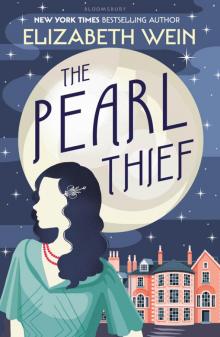 The Pearl Thief
The Pearl Thief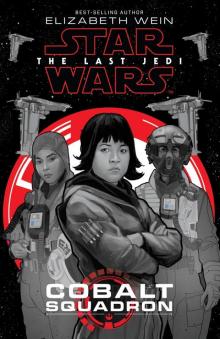 Cobalt Squadron
Cobalt Squadron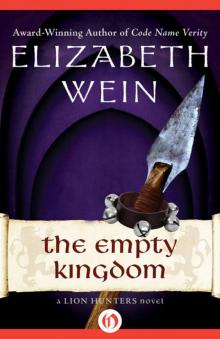 The Empty Kingdom
The Empty Kingdom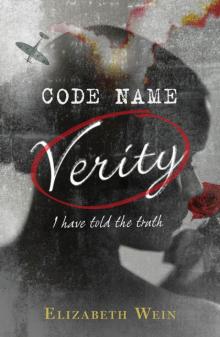 Code Name Verity
Code Name Verity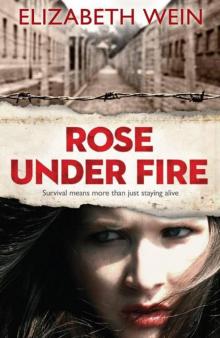 Rose Under Fire
Rose Under Fire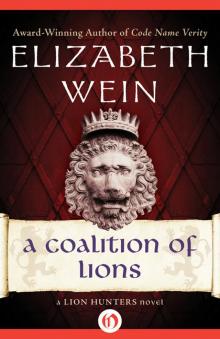 A Coalition of Lions
A Coalition of Lions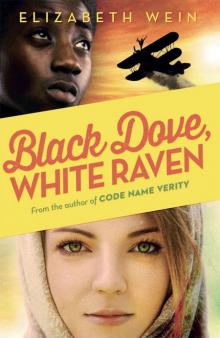 Black Dove, White Raven
Black Dove, White Raven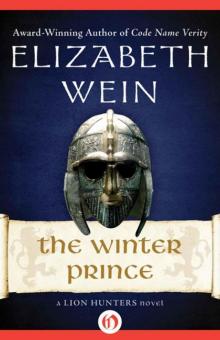 The Winter Prince
The Winter Prince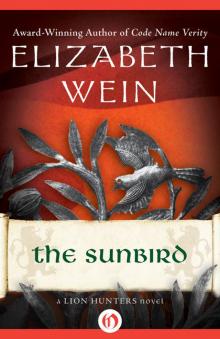 The Sunbird
The Sunbird